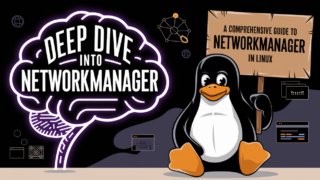In the world of Silicon Valley, where startups often rise and fall at a dizzying pace, one company has quietly transformed from a humble research project into a $62 billion tech giant. That company is Databricks, and its CEO, Ali Ghodsi, is the visionary behind this meteoric rise. What makes Databricks’ journey especially fascinating is …
DevOps
NetworkManager Tools NetworkManager is a system service in Linux distributions that manages network devices and connections. Here are some tools you can use to control NetworkManager and refresh the network interface configuration: nmcli: This is a command-line tool for interacting with NetworkManager. You can use it to control connections, devices, and other networking aspects. To …
This article provides a comprehensive guide on renaming network interfaces in Red Hat Enterprise Linux (RHEL), focusing on the differences between the traditional ifcfg format and the newer keyfile format for NetworkManager connection profiles. Understanding RHEL’s Network Interface Naming Traditionally, Linux kernels assigned interface names like eth0, eth1, etc., based on the order of detection …
Introduction to NetworkManager in Linux NetworkManager is a system service that manages network devices and connections on Red Hat Enterprise Linux (RHEL). It automatically creates connection profiles for each Ethernet adapter in a host and, by default, uses DHCP for both IPv4 and IPv6 connections. NetworkManager supports various network types, including Ethernet, bonds, teams, VLANs, …
Introduction to the vi Command vi (short for “visual editor”) is a screen-oriented text editor that is ubiquitous in Linux and Unix-like operating systems. It’s known for its power, efficiency, and modal editing approach, which can initially seem cryptic to new users but offers significant advantages once mastered. Modal Editing: vi’s modal editing distinguishes it …
Introduction to the nmcli Command The nmcli command is a powerful command-line tool in Red Hat Enterprise Linux (RHEL) used to manage network connections through the NetworkManager service. It provides a comprehensive interface for configuring, monitoring, and troubleshooting various network aspects, from basic Ethernet connections to advanced features like bonding, VLAN tagging, and more. Key …
In the ever-evolving landscape of network management, having the right tools at your disposal is crucial for ensuring seamless connectivity and efficient resource utilization. Two powerful command-line utilities, nmstatectl and nmcli, are at the forefront of managing network configurations in Red Hat Enterprise Linux (RHEL). While both tools serve the essential purpose of configuring and …
As a cloud infrastructure enthusiast, I’ve always been fascinated by the power and flexibility of container orchestration, particularly with Kubernetes. However, running Kubernetes in production comes with its fair share of challenges. Recently, I faced a series of issues that tested my troubleshooting skills and deepened my understanding of Kubernetes. In this article, I’ll share …
In the highly competitive field of software engineering, crafting a compelling resume can be the key to unlocking lucrative opportunities. Alex Nguyen, a former software engineer at Amazon and Microsoft, now at Google, shares his insights after landing an impressive $300,000 offer at Google. His resume not only opened doors but also became a guiding …
In today’s fast-paced IT landscape, automation is no longer just an option; it’s a necessity. Among the many tools available, Ansible stands out as a powerful automation framework that simplifies the management of complex systems. This article will delve into some essential Ansible tips that can help you maximize its capabilities. From basic commands to …






